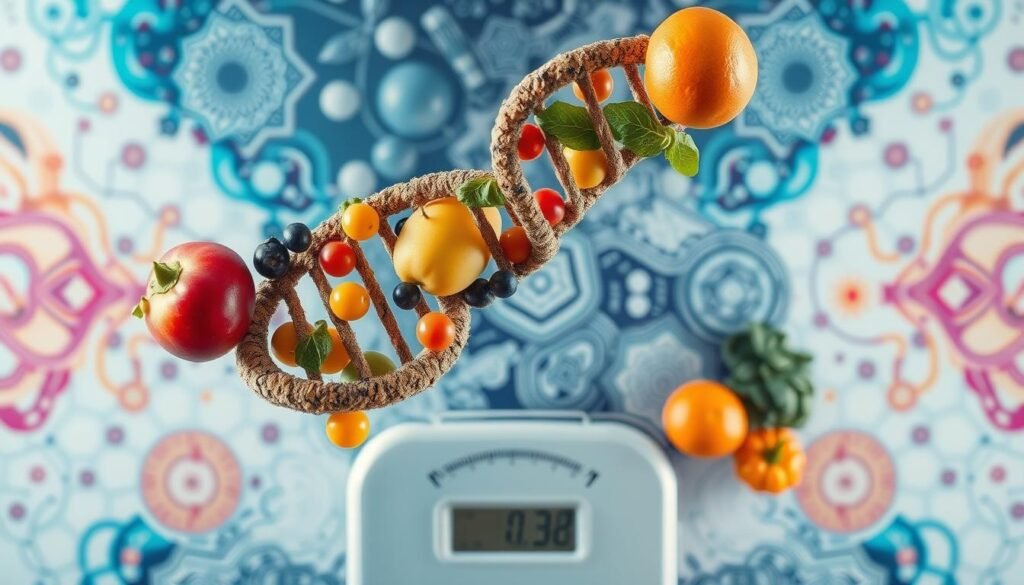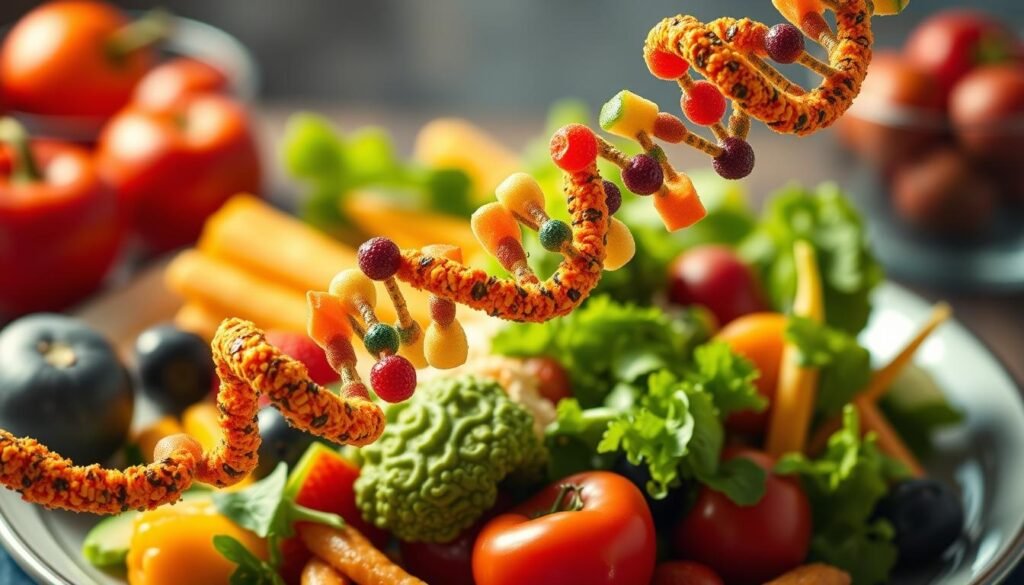Ever wondered why some diets work great for others but not for you? It might be because of your DNA. Personalized nutrition is changing how we eat by making diets fit our genes. This new field shows how our genes affect what we eat and how healthy we are.
Research shows that diets based on our genes can really change how we eat. One study found that people made big changes in their diet, up to 19%. This shows we need a diet that’s just right for us, not one size fits all.
Using our genes to guide our diet can make us healthier than ever. Next, we’ll explore how knowing our genes and diet can improve our health.
Key Takeaways
- Personalized nutrition tailors dietary plans based on genetic makeup.
- Nutritional genomics can influence dietary needs and preferences.
- Studies indicate significant behavioral changes in diet through personalized guidance.
- Understanding DNA can optimize health and well-being more effectively.
- Genetic insights are essential for preventing diet-related chronic diseases.
Understanding Personalized Nutrition
Personalized nutrition looks at what makes each person unique to give them the right diet. It’s key in nutrition science, as more people get chronic diseases. In the U.S., 60% of adults have at least one chronic disease, showing a big health problem.
Seven of the top ten causes of death are linked to these diseases. This shows we really need diets that fit each person’s needs to lower health risks,).
More people are interested in home-testing kits and genetic testing. This shows a trend towards health plans that fit each person. Research shows that how we react to food can differ a lot, even among twins,).
The gut microbiome is also getting more attention. It plays a big role in our health, affecting things like obesity and heart disease.
In 2022, the National Institutes of Health gave $170 million to study personalized nutrition. This shows how important it is to keep researching. Tools like chromatography and spectroscopy help us understand how diet and genetics work together. Personalized nutrition aims to make people healthier and prevent diseases by tailoring diets to each person’s needs.
What is Nutrigenomics?
Nutrigenomics is a new field that studies how our genes and what we eat affect our health. It looks at how different genes react to different foods. This means we might need to eat in ways that are just right for our genes.
Studies show that our genes can change how we process food. This can affect our health in big ways.
Today, we know that our lifestyle and environment play a big role in how we react to food. The nutrition world is changing to make products for specific groups, like athletes or people with chronic diseases. This move shows a shift from old ways of thinking about food to new ones that focus on keeping us healthy.
Nutrigenomics could change how we get advice on what to eat. By understanding how our genes affect our food choices, we can make better diets. This research could lead to better nutrition by matching our diets to our genetic makeup.
The Role of DNA in Dietary Choices
DNA plays a key role in my dietary choices, guiding how my body reacts to food. Studies show that genetics can influence everything from how we digest food to our taste preferences. A study with 700 identical twins and 400 non-twins found big differences in how people react to food.
This shows how important it is to know my nutrition genetics profile. The study found that genetics only play a small part in how we respond to insulin and triglycerides.
Research also shows that people can react differently to the same foods. This means that there’s no one-size-fits-all diet for everyone. The rs7903146 variant in the TCF7L2 gene can increase the risk of type 2 diabetes by affecting insulin sensitivity.
Other studies found no clear link between diet ratios and how we respond to food. Instead, factors like sleep, exercise, and gut health seem to have a bigger impact.
Using DNA analysis can offer insights, but it’s best when combined with daily health tracking. By monitoring my weight, energy, and overall health, I can make changes that don’t rely on genetic tests. This approach helps me see the bigger picture when planning my diet based on nutrition genetics.
How Are Nutritional Needs Determined by Genetics?
Genetics play a big role in how we digest food. They affect not just what we like to eat but how well we use nutrients. This makes it key to have diets that fit our genetic makeup for the best health.
Some genes tell us how well we take in vitamins and minerals. This means we can get diets that match our body’s needs.
Research shows we need to know about these genetic effects. It tells us that how genes and diet mix can really change our health. For example, some genes can affect how we handle carbs, leading to obesity or diabetes.
This shows why looking at our genes is important for diet plans. It helps us get the right nutrients for our bodies.
Also, nutrigenomics shows that everyone reacts differently to food because of their genes. This means we all need our own diet plans. Our genes can show us what nutrients we need and how our body reacts.
By understanding our genetic makeup, we can make better food choices. This helps us tackle health issues and improve our overall health.
Personalized Nutrition: Key Concepts
Personalized nutrition starts with understanding how our genes and diet interact. Our genes affect how we process food, making our dietary needs unique. By tailoring diets to our genetic makeup, we can see better health results.
Genetic Variations and Dietary Responses
Genetic differences can lead to different health effects from the same diet. My research shows that certain genes impact how we break down nutrients. This knowledge helps create diets that fit each person’s needs.
Metabolic Pathways and Nutrient Absorption
Looking into metabolic pathways helps us understand nutrient absorption. Different pathways can change how well we absorb nutrients, affecting our health. Personalized nutrition can improve nutrient absorption and health by addressing these differences.
Impact of Genetics on Weight Management
Genetics is key in managing weight. Studies show that genetics play a big role in how much kids weigh, even in bad environments. This means we need to tailor weight management plans to each person’s genetic makeup. Understanding these genetics is vital for effective weight loss plans.
In the US, about 43% of adults are obese. Different genes affect how people lose weight on certain diets. A study showed that people on diets matched to their genes lost an average of 5.3 kg. This shows how genetics can help manage obesity better.
Models can predict weight changes from childhood to adulthood. They show the need for weight loss plans that fit each person’s genes. For example, some genes affect how we handle carbs, showing how different we all are in how we process food.
Genes and lifestyle, like diet and exercise, work together. People react differently to diets based on their genes. This makes personalized nutrition key in fighting obesity. Many studies show that diet and genes interact in complex ways, making tailored plans even more important.

As obesity grows worldwide, using genetics in weight management is more critical. By 2025, nearly 20% of adults could be obese. Over 2 billion adults are already overweight or obese, showing the need for personalized weight loss plans that consider genetics.
| Factor | Percentage |
|---|---|
| Adults with Obesity in the US | 43% |
| Adults with Severe Obesity in the US | 9.0% |
| Expected Global Obesity by 2025 | 20% |
| Global Population Affected by Obesity | 2 billion |
The Science Behind Tailored Nutrition Guidance
Tailored nutrition guidance is based on science. It combines genetics, diet, and health outcomes. Unlike one-size-fits-all diets, personalized nutrition fits your unique needs.
Genetic testing has led to new insights. It shows how genes affect how we break down nutrients. Knowing this helps create diets that meet your specific needs.
Evidence-based nutrition is all about research. It shows how genes and nutrients interact to impact health. Looking at the gut microbiome helps understand diet responses better.
Personalized nutrition can prevent and manage diseases. It’s more effective than general diets.
Many dietitians now focus on personalized nutrition. They use advanced data to make better dietary plans. Programs like Hint Premium keep diets up-to-date with new research.
Developing Individualized Dietary Plans
When I create dietary plans for clients, I look at many factors. I consider their genes, environment, and lifestyle. This way, each diet fits their genetic makeup and meets their personal needs.
Companies like The DNA Company and Genetic Direction are gaining popularity. They offer genetic testing kits that help me understand how people metabolize nutrients and what they might be sensitive to. This lets me create custom meal plans that work better for each person. Tests like SpectraCell’s also help me pinpoint specific vitamin and mineral deficiencies.
To make nutrition plans better, I use tools like OmegaQuant’s fatty acid assessments. These tests show how balanced someone’s omega-3 and omega-6 levels are. This helps me suggest dietary changes for better heart health. I also use tests like the GI Map for gut health and the DUTCH test for hormone levels. These help me tailor meal plans for better wellness and energy.
I also draw from recent studies. For example, the MIND diet is backed by research. It helps slow down cognitive decline and may lower Alzheimer’s risk. Personalized nutrition advice can lead to big changes in what people eat, which is key for health goals.
By using a holistic approach, I build strong relationships with my clients. This leads to lasting changes in their diets. My goal is to empower them to make better food choices and improve their health.
How to Get Genetic Testing for Personalized Nutrition
People looking for personalized dietary assessments can find genetic testing through many companies. GenoPalate is a great choice, giving dietary tips based on your DNA. They use over 150 genetic markers to give you detailed dietary advice that can boost your metabolic health.
GenoPalate’s results come quickly, in 24 hours if you upload your DNA. If you need a new DNA test, it takes 4-6 weeks. Prices are good, starting at $99 for uploading DNA and $149 for new kits during sales.
Many people are changing their diets based on genetic testing results. This shows a big interest in knowing how our genes affect our nutrition. More clinics and health experts are now helping with DNA-based nutrition plans.
This growth is great for those into nutrition genomics. It lets them make better diet choices with guidance.
It’s key to pick trusted companies for these services. They should offer accurate analyses and helpful advice. This makes sure your personalized diet plans work well.
Custom Meal Plans Based on Genetic Insight
Custom meal plans are made with genetic insight from DNA analysis. They focus on what each person needs and likes to eat. For example, myDNA gives over 30 DNA insights to help people be their healthiest. This helps tailor nutrition adaptations for better health.
Studies show certain genes affect how we eat, store fat, and keep weight off. These plans fit with what our genes tell us, helping us reach our health goals. They also tell us about exercise, injury risks, and best workout styles based on our DNA.
Even caffeine intake can be personalized. This helps us choose foods and drinks that are good for us.
The test is easy, just a one-minute cheek swab, and results come in 10-15 days. This quick process, along with strong privacy, makes genetic testing useful for better eating habits.
| Features | Description |
|---|---|
| Number of Insights | Over 30 dietary insights based on initial DNA test results |
| Team Expertise | Includes geneticists, pharmacologists, sport dieticians, and nutritionists |
| Testing Method | One-minute cheek swab; results within 10-15 days |
| Privacy Assurance | Data security and anonymity without third-party sharing |
| Membership Benefits | Access to daily meal plans, workout plans, and personalized guidance |
Evaluating Personalized Nutrition Services in the Market
The market for personalized nutrition services is growing fast. Many genetic testing platforms are now available. It’s important to look at these services carefully to make good health choices.
Common Platforms Offer Genetic Testing
Many platforms offer genetic testing for nutrition. They have easy-to-use interfaces and clear reports. Some services explain how genes affect metabolism and nutrient absorption.
It’s key to check if these platforms are credible. They should be based on scientific research. This ensures their advice is reliable.
What to Look for in Personalized Nutrition Consulting
When looking for nutrition consulting, check the consultants’ qualifications. Services with registered dietitians are best. They give advice that’s backed by science.
Also, look for ongoing support. This can include meal planning and lifestyle coaching. Regular check-ins help keep you on track with your health goals.
By carefully evaluating personalized nutrition services, I can find the right one for me. Knowing what each service offers helps me make choices that improve my health.
Success Stories and Benefits of Personalized Nutrition
Personalized nutrition has changed how we think about health and wellness. It offers customized diets that really work. For example, Roots Food Group is leading the way in healthy eating. They create nutrition plans that fit each person’s needs.
This mix of science and cooking makes meals that are both tasty and healthy. They help people reach their health goals and follow their dietary rules.
Studies show that 80% of people see great results with personalized nutrition. These plans can greatly improve health, even for those with chronic conditions or different diets. Genetics are key in figuring out what each person needs from their diet.
Experts use detailed talks to make sure meals fit each person’s health goals and any allergies.
Success stories from Roots Food Group show how personalized nutrition can change lives. In the US, almost 40% of adults are obese. Personalized diets offer a better way than just cutting calories. They help people make lasting changes, showing a new way to think about dieting.
Challenges and Limitations of DNA-Based Diets
The idea of DNA-based diets is fascinating, but we must face the challenges of DNA diets. Studies show that genetics only partly explain how we react to food. This means we need more tailored nutrition plans (Zeevi et al., 2015). Lifestyle, environment, and personal taste also affect our health, making it hard to apply genetic tests to our diets.
There are limitations of personalized nutrition to consider. Relying only on genetic tests might not work. Nutrigenomic tests look at over 70 genes to understand disease risks and food likes. Yet, these tests can’t account for things like stress and exercise. Many claims about personalized nutrition are not backed up by solid evidence, so we should be careful.
Personalized nutrition has its downsides. It can make us think our genes dictate our food choices too much. It might also lead to feeling isolated because of strict diets. Spending a lot on plans and gadgets can confuse us, making us question the value of genetic info over basic nutrition knowledge.
It’s important to understand these issues before trying a DNA-based diet. Making lasting changes in our diet should include exercise and managing stress. By combining personalized nutrition with solid science, we can make better choices for our health.
Conclusion
Reflecting on personalized nutrition, it’s clear it’s a big step forward. It meets unique health needs in a new way. A study with over 347 people aged 41-70 showed big health improvements in those who followed personalized diets.
This study shows personalized nutrition works well. It helps manage health through tailored plans. This is a key point about personalized nutrition.
The future of nutrition genomics looks bright. It combines genetics and diet for better wellness. Research shows personalized nutrition boosts health for individuals and the community.
Understanding how DNA affects diet is just starting. More research could lead to big advances in nutrition science.
As I explore personalized nutrition, it’s clear it’s a game-changer. It combines genetic insights with diet for better health. This approach lets people make diet choices based on their genes.
It could change how we see nutrition. Personalized nutrition empowers people to make better diet choices. It’s a step towards a healthier future.


